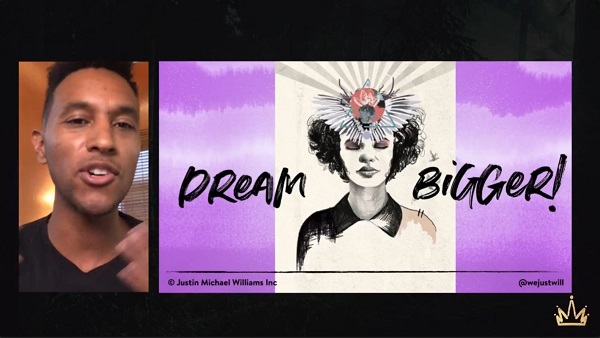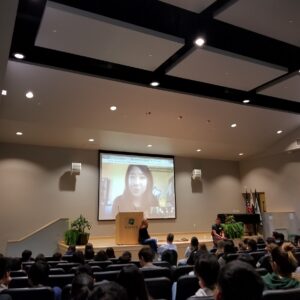On Tuesday, Harker’s LIFE (Living with Intent, Focus and Enthusiasm) organization held a special assembly featuring speaker, singer and author Justin Michael Williams, who shared with students and staff his life story and offered insight on how meditation could help people “start living life on [their] terms.”
Originally from the East Bay city of Pittsburg, Williams recalled growing up in a poor neighborhood “in a home with gunshot holes on the outside of my house,” and frequently being teased for being Black and gay. Inspired by his grandmother, whom he called “Baca,” he worked hard to pursue his dreams of becoming a recording artist and attending UCLA.
Williams talked about dealing with his childhood traumas by becoming a “chronic overachiever,” becoming the class president, valedictorian and drumline captain at his high school on his way to earning a full-ride scholarship to UCLA. These achievements were impressive on the outside, he said, “but on the inside what’s happening is we don’t know to separate our self-worth and our self-confidence and our self-love from our achievements, what we do and our validation.” This in turn leads to people constantly comparing themselves to others and relentless self-criticism.
After a visit to a therapist, Williams was advised to try meditating. He was skeptical at first, but later found the practice to be transformative. Within a few years of practicing meditation, he had one of the Top 20 albums on iTunes.
Williams’ initial skepticism of meditation – practiced for centuries by indigenous people from across the world – was partly the result of it being “colonized, demonized, corporatized and sold back to us,” he said. In response, he released his own book on meditation earlier this year. He explained that one of many misconceptions about meditation is that it requires practitioners to stop thinking, which he countered. “We don’t want the mind to stop thinking,” he said. “What we want is to get our thoughts to work for us instead of against us.”
He then led the attendees in a well-received meditation exercise in which they visualized a future they wanted to see. This, he said, helped people find out for themselves who they needed to be instead of the steps they need to take. “You can check every box on your list,” he said, “but if you haven’t changed at your level of being, of who you are, then you cannot show up for the world differently and you cannot show up for your life differently and you’ll end up in the same cycles over and over and over.”
Key to the practice of meditation, Williams said, is to spread the energy captured in the self to other people to effect change in the world, highlighting the relegation of Black people in America to that of lower class citizens. “If we’re just focusing on ourselves, we’re missing the point,” he said, “because we’re all connected, we’re all responsible for being a good ancestor on this planet.”











